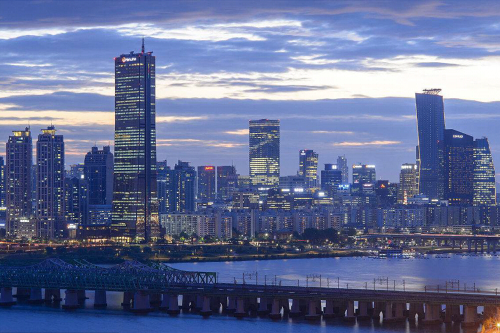South Korean Exporters: Films Are the New Stars
韩国出口商:电影是新明星
Ships and steel suffer, but the entertainment industry shines
船舶和钢铁业痛苦不堪,但娱乐业欣欣向荣
For an export juggernaut, South Korea’s recent losing streak is alarming: for 14 straight months its exports have fallen in value terms compared with a year earlier. In January they plummeted by 18.8% to just under $37 billion – the steepest drop since 2009. Petrochemical products are a key South Korean export, so low global oil prices partly explain the numbers. Still, the country’s longtime engines of growth, including steel mills, shipyards and car plants, appear to be running out of puff.
作为一个出口大国,韩国近来不断丢城失地,令人担忧:以价值计,其出口连续14个月同比下跌。1月出口额暴跌18.8%至不到370亿美元,这是2009年以来的最大跌幅。石油化工产品是韩国主要的出口产品,国际油价如此之低,是出口额猛跌的原因之一。而且该国长期以来的增长引擎,包括钢铁厂、造船厂和汽车制造厂,似乎也渐渐力不从心。
Last year POSCO, a steel giant set up in 1968, posted its first annual net loss. It had already been bumped down the global rankings by Chinese and Japanese rivals, from third- to fifth-largest producer, between 2010 and 2014. In March Daewoo Shipbuilding & Marine Engineering (DSME), one of the world’s biggest shipbuilders, recorded its worst deficit on record, losing more than 5 trillion won ($4 billion) in 2015. Its sales fell by almost a quarter. It laid off 13,000 workers last year; now it says it will dismiss a further 12,000. In January Hyundai Motor, a carmaker, reported a drop in profits for an eighth straight quarter. It expects sales (combined with those of its affiliate, Kia Motors) to inch up by 1.5% this year – a fraction of the 24% growth achieved in 2010.
去年,成立于1968年的韩国钢铁巨头浦项制铁公司(POSCO)首次公布了年度净亏损。从2010年到2014年,在中国和日本对手的夹攻下,它的全球排名已从世界第三跌至世界第五。三月,全球最大的造船厂之一大宇造船海洋株式会社(Daewoo Shipbuilding & Marine Engineering,DSME,以下简称大宇造船) 录得史上最严重的赤字,2015年亏损超过5万亿韩元(40亿美元)。公司的销售额几乎下跌了四分之一。大宇造船去年裁减了13000名员工,现在公司称还将进一步裁员12000人。一月,现代汽车公布盈利下滑,这已经是连续第八个季度如此。该公司预计今年的销售额(加上其下属公司起亚汽车)将微增1.5%,还不到2010年24%增长的零头。
Such firms are being hurt by growing output among Chinese producers and by the won’s recent strength against the yen, which is helping Japanese rivals. South Korea’s exports are equivalent to around half of its GDP, and a quarter of them go to China, where growth has been faltering. Ryu Seung-sun, head of research at Mirae Asset Securities in Seoul, says that because South Korea exports parts for consumer goods, like screens and chips for Chinese smartphones, it is bound to be among the first to suffer from a worldwide slowdown.
中国生产商的产出越来越多,加上韩元近来对日元的升值又给了日本对手助力,因而这些韩国公司身受重创。韩国的出口约等于其GDP的一半,其中四分之一出口到中国,而中国的增长已经放缓。首尔未来资产证券(Mirae Asset Securities)的研究部主管柳承顺(音译,Ryu Seung-sun)认为,因为韩国出口消费品的零部件,如中国制造智能手机所用的显示屏和芯片,所以在全球经济放缓时注定首当其冲。
However, Park Sangin, an economist at Seoul National University, thinks internal factors are the bigger culprits: after all, the country’s economy weathered the recent global recession with relative ease, he says. Many of its sprawling conglomerates are built around the smokestack industries that powered the country’s industrial take-off under Park Chung-hee, a former dictator (and father to the current president, Park Geun-hye) over four decades ago, with the result that manufacturing accounts for as much as a third of South Korea’s GDP today. Over the years these chaebol, as the conglomerates are known, have expanded into all sorts of sectors. One-tenth of their offshoots are now unprofitable “zombie” firms, kept on life support through cross-shareholdings.
但是国立首尔大学的经济学家朴尚义(音译,Park Sangin)认为内因才是罪魁祸首: 毕竟,韩国经济相对较轻松地熬过了最近的全球衰退,他说。该国很多不断扩张的企业集团集中在重工业领域,这些行业在四十多年前,前独裁者朴正熙(也是现任总统朴槿惠的父亲)当政期间曾推动韩国工业腾飞,结果今天制造业占韩国GDP高达三分之一。时过经年,这些被称作“财阀”(chaebol)的企业集团已经扩展到各个经济部门。它们的分支有十分之一现在是没有利润的“僵尸”公司,靠着交叉持股而存活。

Some industrial groups have begun to shed ailing, non-core businesses; DSME, for example, is selling a subsidiary that runs golf courses. However, others are continuing to diversify in pursuit of new sources of growth. As Samsung’s electronics affiliate has lost market share to plucky smartphone-makers in China, the group has moved, among other things, into biopharmaceuticals, the pet project of the conglomerate’s de facto boss, Lee Jae-yong. Samsung BioLogics recently broke ground on its third production plant which, when up and running, will make it the world’s largest manufacturer of such drugs.
有的产业集团已经开始摆脱境况不佳的非核心业务;例如大宇造船正出售一家经营高尔夫球场的子公司。但是其他公司仍在继续多元化,以追求新的增长点。三星旗下电子公司的市场份额被中国胆识过人的智能手机生产商们所抢夺,因此公司转向生物制药等领域,这是集团实际老板李在镕个人偏爱的计划。三星生物制剂公司(Samsung BioLogics)的第三座生产厂最近破土动工,待其建成运营时将成为世界上最大的生物制药厂。
Other businesses are thriving despite the downturn. Seven of the ten best-performing stocks last year in the MSCI Asia Pacific Index, a benchmark followed by big investment funds, were South Korean, among them pharmaceutical, cosmetics and aerospace firms.
尽管经济低迷,其他行业却仍然欣欣向荣。去年,在被大型投资基金引为基准的摩根士丹利资本国际亚太指数(the MSCI Asia Pacific Index)里,表现最佳的十只股票中有七只来自韩国,其中有制药、化妆品和航空航天公司。
Media stocks have been buoyed recently by the success of CJ E&M, a subsidiary of CJ Corp, another chaebol. The affiliate established itself as an export star with the hit 2013 film, “A Wedding Invitation”, made for the Chinese market with Chinese actors but a Korean crew. In November last year MSCI added CJ E&M to its Korea index, as it bumped out Daewoo Shipbuilding and Hyundai Merchant Marine, a struggling shipping line. As media firms profit from the popularity of Korean soap operas, films and music in China and South-East Asia, more are partnering with Chinese firms to produce or promote content.
近来由于另一家韩国财阀CJ集团旗下CJ E&M的成功,媒体股票得以提振。这家下属公司凭借2013年的卖座影片《分手合约》树立了自己出口明星的地位,该片瞄准中国市场,由中国演员出演,但由韩国团队制作。去年11月,MSCI将CJ E&M纳入其韩国指数,而把大宇造船和一家苦苦挣扎的航运公司现代商船(Hyundai Merchant Marine)剔除在外。由于媒体公司的盈利来自韩国肥皂剧、电影和音乐在中国及东南亚的流行,它们越来越多地与中国公司联合制作或推广内容。
It is doubtless a good thing that the South Korean economy no longer has all of its export eggs in a handful of heavy-industrial baskets. But cultural and fashion businesses are no less volatile and vulnerable to global trends than ones that make stuff out of lumps of metal. In February, South Korea’s two biggest cosmetics-makers, Kolmar Korea and Cosmax, which now depend heavily on the Chinese market, announced lacklustre earnings. Even a more diverse export base is not enough to protect South Korea entirely from the chill winds blowing across Asia.
韩国经济不再把所有的出口鸡蛋都放在那几个重工业篮子里,这无疑是好事。但是和用金属块制造产品的行业相比,文化和时尚行业同样变化多端,容易受到全球趋势的影响。二月,韩国最大的两家化妆品生产商,科玛(Kolmar Korea)和科丝美诗(Cosmax)宣布盈利不佳,这两家公司现在非常倚重中国市场。冷风吹遍亚洲,即便出口基础更加多元也无法保护韩国全然不受其影响。
下载:英文、中文版本








